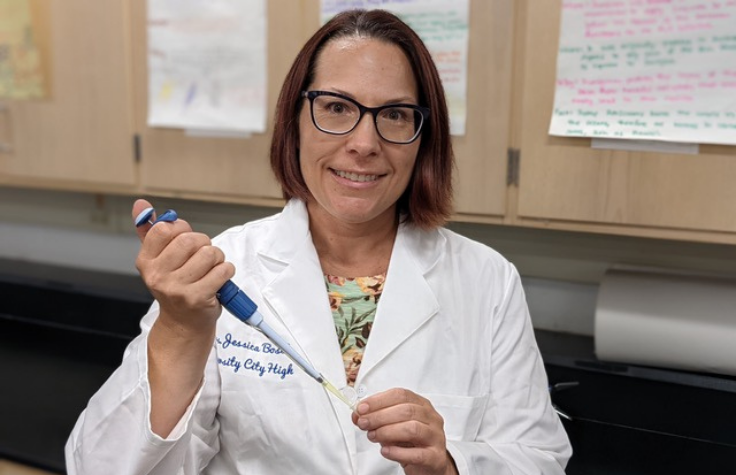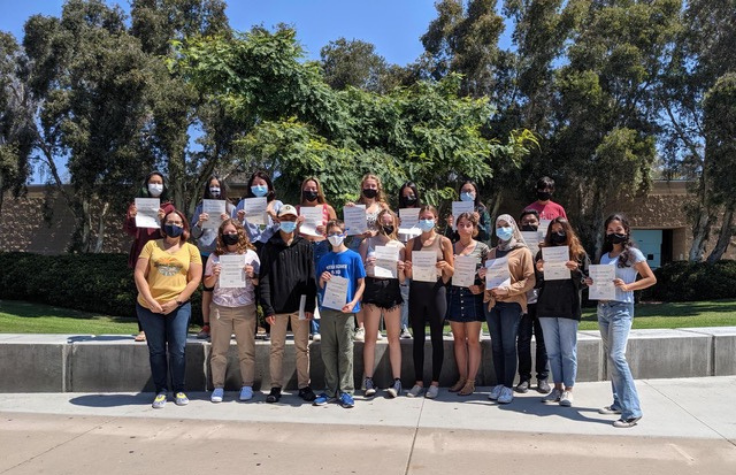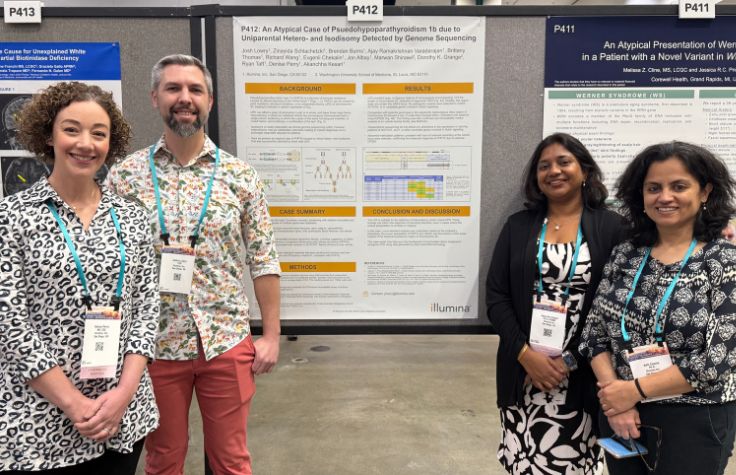
September 1, 2021
From a young age, Jessica Bosch knew she wanted to be a biology teacher. She always loved science, competing in science fairs in middle and high school. After high school, she went on to study cell molecular biology at San Diego State University and spent eight years in drug discovery research at biotech companies. But as much as she loved the science and lab-based work, she knew it was time to transition her passion and expertise into teaching.
Now at University City High School in San Diego, CA, Bosch is entering her thirteenth year of teaching science. ‚ÄúI love running labs with my students and seeing the confidence they gain when they succeed‚ÄĒor when something doesn‚Äôt work, and they use their critical thinking skills to figure out what happened,‚ÄĚ says Bosch. ‚ÄúThere is strength in taking risks and not knowing the outcome. It‚Äôs like the scientific process in education in a way.‚ÄĚ
Last year, Bosch became one of 17 teachers trained on a new Lab-in-a-Box experience called . The program is the result of a partnership between VR’ś»ň≤ ∆Ī and , and brings next-generation sequencing (NGS) into high school classrooms. Each classroom receives VR’ś»ň≤ ∆Ī sequencing technology, an iSeq 100, and the materials needed to run a robust experiment. The goal is to provide the resources that mirror industry protocols such as a thermal cycler, fluorometer, centrifuge, vortexer, reagents, pipettes, PCR tubes, and more.
‚ÄúWe aim to make NGS more accessible in education settings, empower teachers, and inspire students,‚ÄĚ says Sharon Vidal, Global Lead of Corporate Social Responsibility at VR’ś»ň≤ ∆Ī. ‚ÄúGenomics is an industry at the intersection of technology and biology with boundless opportunities for future careers.‚ÄĚ
Bosch knows how important it is for her students to learn by doing, to get their hands on the scientific process, and to make connections with working scientists at local companies like VR’ś»ň≤ ∆Ī. She regularly collaborates with industry insiders to inspire her students to explore science careers beyond what they are often most exposed to‚ÄĒbecoming a doctor or a nurse.
‚ÄúTeaching like this makes me want to come to work every day,‚ÄĚ says Bosch. ‚ÄúMy students love being able to solve real-world scenarios through labs, even more so when we have access to the latest technology like a sequencer in the classroom‚ÄĒand direct connections to VR’ś»ň≤ ∆Ī scientists doing this work every day.‚ÄĚ

In July, Bosch brought VR’ś»ň≤ ∆Ī Genomic Discoveries on campus for 20 summer school students. They learned about whole-genome sequencing through a simulated food-borne illness outbreak scenario using VR’ś»ň≤ ∆Ī‚Äôs Sequencing by Synthesis protocol. Students walked through the lab protocols and techniques, visually documenting each step. They used pipettes to prep samples for sequencing, creating DNA libraries with magnetic beads, sequenced them in an iSeq machine, and concluded the experiment using bioinformatics to analyze the data and solve the outbreak.
‚ÄúThe VR’ś»ň≤ ∆Ī Genomic Discoveries experience has a huge impact on students,‚ÄĚ says Bosch. ‚ÄúIt opens up a whole new world to them and gives them confidence that they can be successful in something that seemed out of reach before.‚ÄĚ
One of her students is high-functioning autistic and was hesitant to speak at the beginning of the experiment. By the end of the experience, he learned how to pipette and articulated his high-quality results. Another student shared what he learned with his mother and discovered a new interest in her past biotech work experience.
‚ÄúIt‚Äôs exciting to partner with passionate teachers like Ms. Bosch and industry leaders such as VR’ś»ň≤ ∆Ī on a new and innovative program like VR’ś»ň≤ ∆Ī Genomic Discoveries,‚ÄĚ says Howard Chan, Education Program Manager at Biocom California Institute. ‚ÄúGetting this in-depth with the science and utilizing cutting-edge sequencing technology in high school classrooms provides a unique opportunity for students on their paths to a potential career in STEM.‚ÄĚ
In the 2021‚Äď2022 school year, Bosch, along with 15 other San Diego County-area high school science teachers will be implementing the new protocol in person with their students for the first time. Based on insights and feedback from this year‚Äôs implementation, the plan is to expand the program to regions around the US, starting with the San Francisco Bay Area, Madison, WI, and Baltimore, MD. To support the growth of the program and reach into communities not otherwise possible, a virtual simulation is also in development.
‚ÄúI want to send young adults out into the world who are hard-working, can think critically, make good decisions, and genuinely care about others and making a difference in the world around them,‚ÄĚ says Bosch. ‚ÄúIt would be awesome if a few became famous scientists as well.‚ÄĚ
VR’ś»ň≤ ∆Ī Genomic Discoveries provides teacher training, curriculum, and lab experiences to San Diego high schools with a focus on underserved communities. The program includes a four-day summer professional development workshop and an introduction to careers in biotech through VR’ś»ň≤ ∆Ī employees, as well as training and support throughout the process.
VR’ś»ň≤ ∆Ī is committed to equitable access to STEM education for all, with the goal of empowering students to envision themselves as future scientists, innovators, and trailblazers.
For more on VR’ś»ň≤ ∆Ī Genomic Discoveries, click .
To learn more about University City High School’s Biomedical Sciences Program, click .
See the .
Sign up to receive updates on VR’ś»ň≤ ∆Ī‚Äôs STEM Outreach Program.
Learn more about our other .


